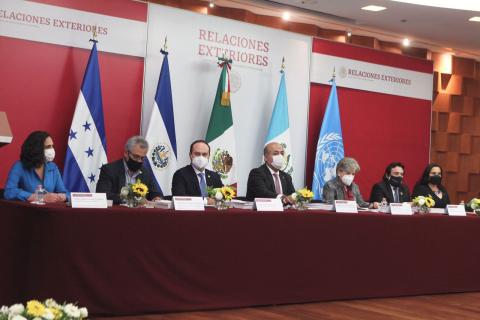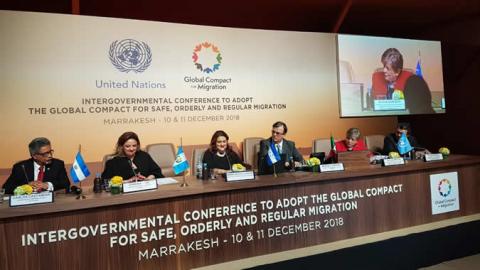Press Release
The Executive Secretary of the UN Economic Commission for Latin America and the Caribbean (ECLAC), Alicia Bárcena, presented the El Salvador-Guatemala-Honduras-Mexico Comprehensive Development Plan to President Juan Orlando Hernández and the Government of Honduras and participated in the inauguration of the National Commission on the 2030 Agenda for the Sustainable Development Goals (NC-SDG) and the Technical Committee for Sustainable Development, in the context of an official visit to Tegucigalpa on July 24-25.
“The 2030 Agenda for Sustainable Development and the Central America-Mexico Comprehensive Development Plan invites us to think differently, to change the conversation between the State, the market and society. Honduras can count on the United Nations and ECLAC to carry it forward. This is a historic opportunity that we cannot pass up,” stated Bárcena during her visit.
On Wednesday 25 in a meeting at the Presidential House, the ECLAC Executive Secretary presented the El Salvador-Guatemala-Honduras-Mexico Comprehensive Development Plan for the first time to President Juan Orlando Hernández and the Government of Honduras, whose fundamental purpose is to formulate a diagnosis, offer recommendations to advance toward a new style of development and generate a new vision regarding the complexity of the migratory process, according to the mandate given by the presidents of the four countries to ECLAC on December 1, 2018 in Mexico City, during the swearing-in of President Andrés Manuel López Obrador.
Later, on Thursday 25, Alicia Bárcena offered a keynote speech on the 2030 Agenda and the Comprehensive Development Plan during the opening ceremony of the NC-SDG and the Technical Committee for Sustainable Development, also led by President Juan Orlando Hernández in the Presidential House.
On the occasion, the Honduran leader said that “the Comprehensive Development Plan for the northern triangle of Central America and Mexico is intimately tied to the achievement of the sustainable development goals,” commending the work done by the Commission. “ECLAC has done an extraordinary job,” asserted the president, assuring that the country has been working for a long time with Mexico and the other Central American countries involved.
“(The Plan) is going to be a turning point. I believe we are on the right road. This is the road we want to follow,” underscored the Head of State.
During her remarks, Alicia Bárcena explained that the Comprehensive Development Plan is the fruit of collaboration among 16 United Nations agencies, funds and programs that operate in Latin America and the Caribbean, and it is an opportunity to strengthen the historic ties between the participating countries, to place migration analysis and related policies in a broad framework of development and, through fairer, more equal and sustainable societies, for migration to be an option and not the only way out within reach.
In its diagnosis, the Plan indicates that the reasons and structural causes of migration that these countries are currently suffering are: inadequate economic growth with poverty and inequality, where 10% of the highest income obtains up to 70 times more than the poorest 10%; high demographic growth in cities and major rural lagging; natural phenomena such as droughts and flooding; violence and insecurity in places of origin; and the huge difference in salaries compared to the United States, the country that has become the destination of most migrant persons.
Some of the 30 specific recommendations included in the Comprehensive Development Plan include progressive taxation to prioritize public investment and eliminate tax privileges, as well as a strengthening of tax administration; raising total investment to a goal of 25% of GDP; leveraging remittances to make them drivers of productive inclusion and local development; greater integration and facilitation of trade, with an emphasis on energy, logistics, infrastructure and regional digitalization.
Bárcena also saluted the inauguration of the National Commission on the 2030 Agenda and the Technical Committee, and underlined that so far 29 countries of Latin America and the Caribbean have institutional mechanisms for the implementation of the 2030 Agenda, 21 of which have presented at least one Voluntary National Review (VNR) at the UN High-Level Political Forum on Sustainable Development.
Honduras presented its review in 2017 and is currently preparing the second for 2020.
Bárcena shared a few of ECLAC’s projections regarding the fulfillment of the SDGs in the region by 2030: The goal of reducing the child mortality rate in children under age 5 has already been met; there has been a positive trend in the percentage of people using the internet; however, the goal of universal and equitable access to potable water at an affordable price for all will not be met; the trend in access to secondary education is not sufficient for all boys and girls to finish the level on time by 2030; and the positive trend in the lower percentage of malnutrition has stopped.
Meanwhile, current economic and distributive performance in the region is not enough to eliminate extreme poverty, underscored Bárcena, who was accompanied during her visit by Igor Garafulic, the UN Representative in Honduras.
On the afternoon of Wednesday 24, ECLAC’s Executive Secretary also met in Tegucigalpa with representatives of the Honduran Council of Private Enterprise (COHEP), with whom she debated the importance and benefits of involvement in the implementation of the 2030 Agenda.
Alicia Bárcana gave a presentation to the business representatives entitled “Agenda 2030: compacts for a sustainable future,” in which she delivered a current social-economic balance for the region and how the 2030 Agenda offers a roadmap for advancing toward a new development style that puts equality at the core.
“The 2030 Agenda is an opportunity to transform business models. It is about going beyond ‘corporate social responsibility’ to integrate the principles of sustainability into corporate culture and drive new sectors with greater competitiveness. Inequality, climate change, disorderly urbanization, violence and social insecurity conspire against the competitiveness of companies,” she stated.



